
-
By:
- ida
- No comment
fear and loathing in las vegas pdf
Hunter S. Thompson’s seminal novel, Fear and Loathing in Las Vegas, is a gripping blend of Gonzo journalism and fiction, set in 1971 Las Vegas. It follows journalist Raoul Duke and his attorney, Dr. Gonzo, as they embark on a surreal, drug-fueled journey, exploring themes of fear, loathing, and the illusion of the American Dream.
Overview of the Novel
Fear and Loathing in Las Vegas, written by Hunter S. Thompson, is a semi-autobiographical novel that blends Gonzo journalism with fiction. The story follows journalist Raoul Duke and his attorney, Dr. Gonzo, on a drug-fueled journey to Las Vegas. The narrative explores themes of fear, loathing, and the decay of the American Dream, offering a surreal and provocative commentary on 1970s America.
Historical Context and Publication
Fear and Loathing in Las Vegas, written by Hunter S. Thompson, was published in 1971. The novel captures the counterculture movement and social upheaval of the era. Its Gonzo journalism style blends reality and fiction, reflecting Thompson’s experiences. The book’s controversial release sparked debate but quickly gained a cult following for its raw, unflinching narrative and critique of American society.
Themes and Key Concepts
The novel explores themes of fear, loathing, and the American Dream. It delves into the psychological effects of drugs and societal disillusionment. Through Raoul Duke’s experiences, Thompson critiques consumerism, politics, and the decay of moral values, offering a chaotic yet profound commentary on 1970s America and the human condition, blending surrealism with harsh reality.
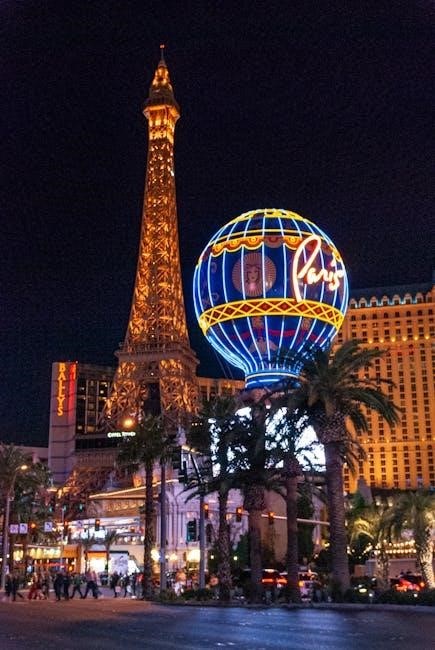
The Plot Summary
The story follows journalist Raoul Duke and his attorney Dr. Gonzo on a chaotic, drug-fueled journey through 1970s Las Vegas, encountering surreal and often disturbing experiences that critique American society.
Main Characters and Their Roles
The novel centers around Raoul Duke, a journalist and protagonist, and his attorney Dr. Gonzo, a eccentric and unpredictable figure. Duke represents Thompson himself, embodying Gonzo journalism, while Gonzo adds chaos and humor. Supporting characters, like hotel staff and a hitchhiker, highlight the absurdity of their journey, reflecting societal critiques and the breakdown of American ideals.
Key Events and Turning Points
Raoul Duke and Dr. Gonzo’s chaotic journey to Las Vegas unfolds with drug-fueled escapades, including their notorious arrival, a pivotal conference on narcotics, and surreal encounters. Their interactions with a hitchhiker and hotel staff escalate the madness, while moments of introspection reveal deeper societal critiques, marking turning points in their exploration of fear, loathing, and the American Dream’s illusion.
Symbolism and Hidden Meanings
The novel is rich in symbolism, with Las Vegas representing excess and illusion. The American Dream symbolizes the illusion of perfection, while drugs symbolize escape and rebellion. Raoul Duke’s duality as journalist and addict reflects societal contradictions. The attorney, Dr. Gonzo, embodies chaotic energy, symbolizing rebellion against order. These elements weave a critique of American culture and the search for meaning amidst moral decay.
Themes Explored in the Novel
The novel delves into themes of fear, anxiety, and the American Dream, critiquing societal excess and moral decay through Raoul Duke’s chaotic journey, blending reality and illusion in 1970s America.
Fear and Its Psychological Impact
Fear, as depicted in the novel, is a primal emotion triggering physiological and psychological reactions. Raoul Duke’s experiences with fear are deeply intertwined with paranoia and drug-induced delusions, reflecting the fragility of the human psyche. Fear becomes a survival mechanism, yet also a source of anxiety, blurring the lines between reality and illusion in the chaotic world of Las Vegas.
Loathing as a Reflection of Society
In Fear and Loathing in Las Vegas, loathing serves as a mirror to societal decay and hypocrisy. Thompson critiques the excesses of American culture, using Las Vegas as a symbol of moral decay. The characters’ disgust reflects broader disillusionment with societal norms, capitalism, and the failed promises of the American Dream, highlighting the tension between illusion and reality.
The American Dream and Its Illusions
Fear and Loathing in Las Vegas deconstructs the American Dream, revealing its hollow promises. Thompson portrays Las Vegas as a symbol of excess and illusion, where the pursuit of wealth and happiness masks moral decay. The novel critiques societal expectations, showing how the Dream’s unattainability fosters disillusionment and despair, reflecting the broader cultural and political upheaval of the 1970s.

Characters and Characterization
The novel revolves around Raoul Duke and Dr. Gonzo, embodying eccentricity and chaos. Their dynamic explores themes of excess, moral ambiguity, and the search for meaning in a decadent society.
Raoul Duke: The Protagonist’s Journey
Raoul Duke, the semi-autobiographical protagonist, navigates a blurred line between reality and delusion in Las Vegas. His journey is a chaotic exploration of fear, loathing, and the American Dream’s illusion. Through excessive drug use and surreal encounters, Duke’s character reflects Thompson’s critique of societal decadence and the search for meaning in a morally bankrupt world.
Dr. Gonzo: The Eccentric Lawyer
Dr. Gonzo, Raoul Duke’s attorney, is a central figure in the novel, embodying raw energy and unpredictability. His eccentric behavior, driven by drugs and a disregard for norms, amplifies the chaos. Gonzo’s character serves as both a partner in Duke’s adventures and a symbol of rebellion against societal constraints, mirroring the counterculture ethos of the 1970s.
Supporting Characters and Their Influence
The hitchhiker, hotel staff, and other minor figures in Fear and Loathing in Las Vegas serve as mirrors to societal dysfunction. They reflect the paranoia, decadence, and chaos of 1970s America. These characters, though fleeting, amplify the themes of fear and loathing, illustrating the broader cultural decay and moral disarray that Duke and Gonzo critique throughout their journey.
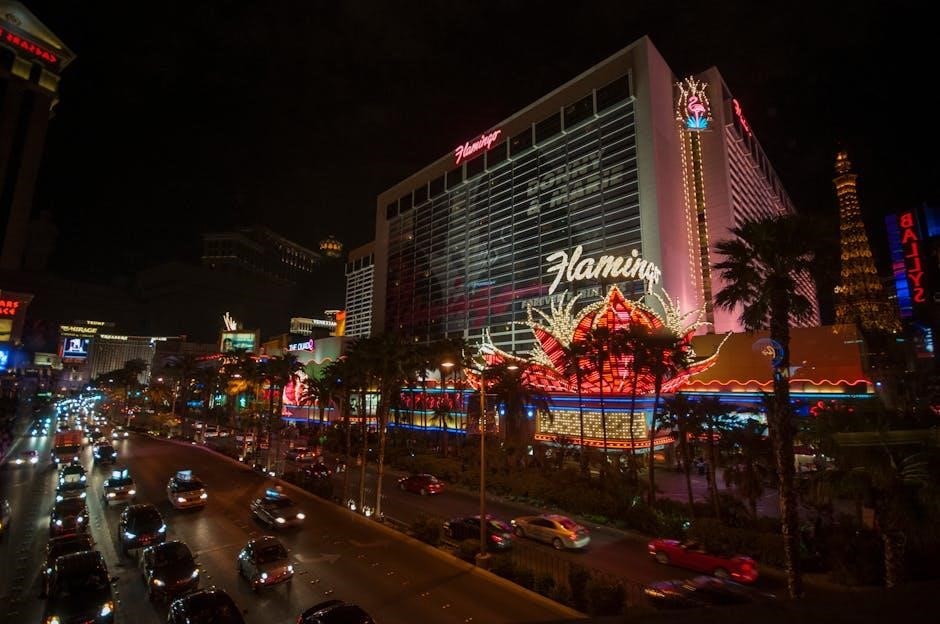
Cultural and Historical Significance
Fear and Loathing in Las Vegas captures the essence of 1970s America, reflecting societal upheaval and the counterculture movement. Its Gonzo journalism style and vivid portrayal of decadence have made it a cultural icon, influencing literature, film, and popular culture while remaining a timeless critique of American society.
The Novel’s Impact on Popular Culture
Fear and Loathing in Las Vegas has left an indelible mark on popular culture, inspiring films, music, and literature. The 1998 film adaptation starring Johnny Depp further cemented its influence. Its vivid imagery and Gonzo journalism style have been referenced in media, making it a cultural touchstone. The novel’s themes of rebellion and excess continue to resonate, solidifying its status as a timeless cult classic.
Connection to the Counterculture Movement
Fear and Loathing in Las Vegas deeply reflects the counterculture movement of the 1970s, rejecting mainstream values and embracing rebellion. The novel captures the spirit of defiance, experimentation, and social critique prevalent during the era. Through its exploration of drug culture and anti-establishment themes, it resonates as a manifesto for those seeking liberation from societal norms, embodying the movement’s essence of freedom and nonconformity.
Legacy and Adaptations
Fear and Loathing in Las Vegas has left an indelible mark on popular culture. Its 1998 film adaptation, directed by Terry Gilliam and starring Johnny Depp, brought the novel to life, further cementing its cult status. The book’s Gonzo journalism style has influenced writers and filmmakers, solidifying its legacy as a groundbreaking work that continues to resonate with audiences seeking unconventional storytelling and rebellious ideas.
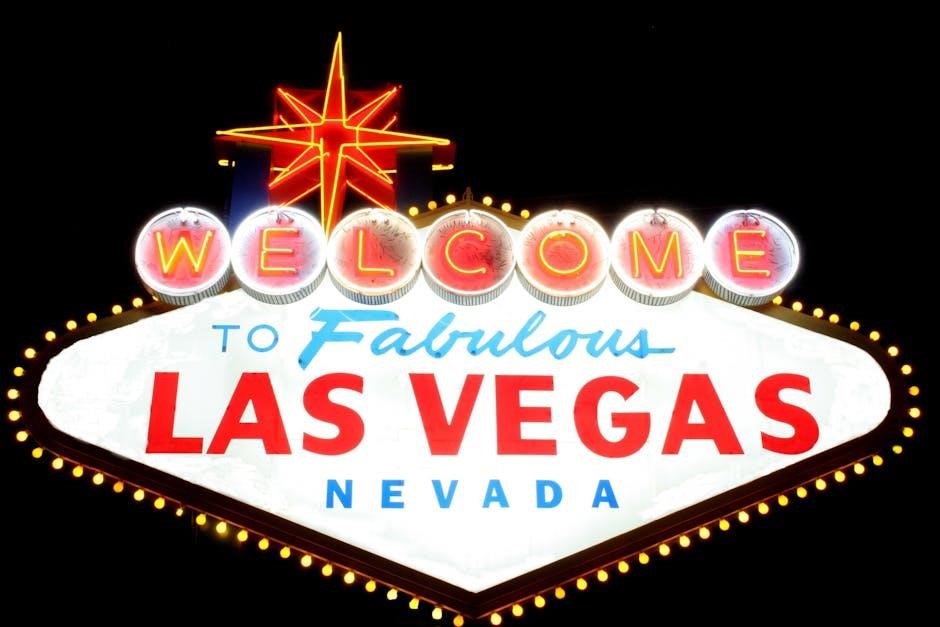
Availability and Access
Fear and Loathing in Las Vegas is widely available as a PDF. Purchase it from online retailers like Amazon or access it through libraries. Ensure legal sourcing for quality and compliance.
Getting the PDF Version: Legal and Ethical Considerations
Accessing Fear and Loathing in Las Vegas as a PDF requires adherence to copyright laws. Purchase from authorized sellers like Amazon or Google Books to support the author and publisher. Avoid pirated versions, as they violate intellectual property rights and undermine the literary community. Legal access ensures quality and contributes to the creator’s legacy.
Downloading “Fear and Loathing in Las Vegas” Safely
Downloading Fear and Loathing in Las Vegas requires caution to avoid malware and legal issues. Use reputable sources like official publishers or trusted eBook platforms. Avoid unverified websites offering free PDFs, as they may compromise your device’s security. Always opt for legal downloads to ensure a safe and guilt-free reading experience while respecting copyright laws.
Reading the Novel in Different Formats
Fear and Loathing in Las Vegas is available in paperback, eBook, and audiobook formats, ensuring accessibility for diverse preferences. The PDF version allows readers to access the novel digitally, while physical copies offer a tactile experience. Audiobooks provide an immersive listening option for those on the go. Choose a legal and safe source to enjoy this iconic story while supporting the author’s legacy;
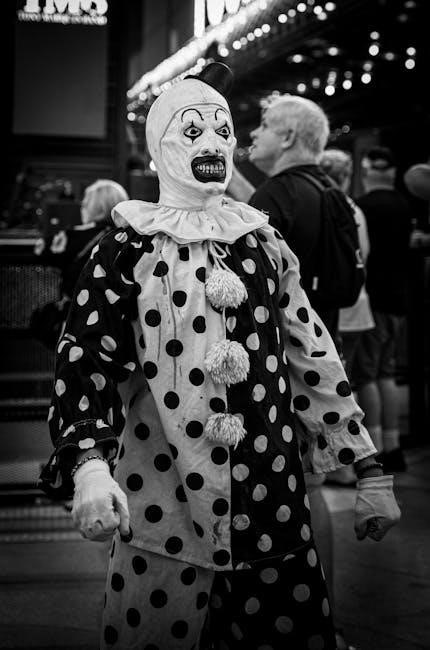
Reception and Reviews
Fear and Loathing in Las Vegas has received widespread acclaim for its raw, unfiltered narrative and Gonzo journalism style. Critics praise its bold exploration of societal decay and personal madness, while readers find it both haunting and thought-provoking. The novel has become a cult classic, resonating with audiences for its unapologetic honesty and dark humor.
Critical Acclaim and Controversies
Fear and Loathing in Las Vegas has garnered both praise and controversy. Critics laud its vivid portrayal of the American Dream’s decay and Thompson’s Gonzo journalism style. However, its explicit content and vivid drug-induced episodes have sparked debate. While some see it as a bold critique of societal norms, others criticize its perceived glorification of excess. The novel remains a polarizing yet influential work.
Reader Responses and Interpretations
Readers of Fear and Loathing in Las Vegas often interpret the novel as a critique of American excess and the shattered ideals of the 1960s counterculture. Many see Raoul Duke’s journey as a metaphor for societal disillusionment, while others focus on its surreal, humorous narrative. The book’s exploration of fear and moral decay resonates deeply, sparking varied interpretations about its themes and implications.

Comparisons with Other Works by Hunter S. Thompson
Fear and Loathing in Las Vegas stands as Hunter S. Thompson’s magnum opus, blending Gonzo journalism with vivid storytelling. Compared to his earlier works like Hell’s Angels, it delves deeper into personal narrative and surrealism. While Fear and Loathing on the Campaign Trail ’72 is more politically charged, this novel captures Thompson’s unique voice, offering a timeless commentary on American culture through its chaotic, drug-infused lens.
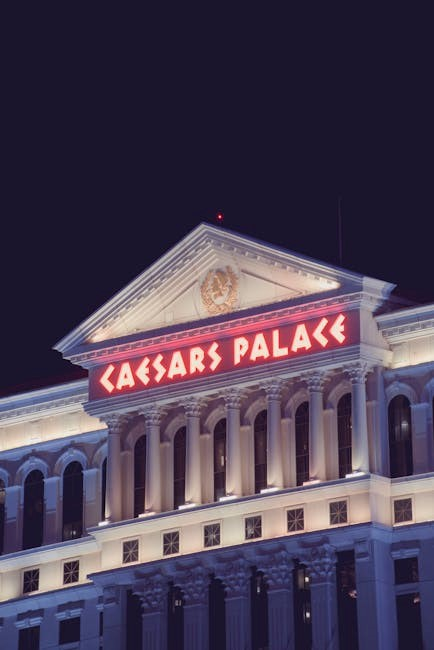
Analysis and Interpretation
Fear and Loathing in Las Vegas masterfully blends journalism with fiction, offering a surreal exploration of American culture. Its psychedelic sequences blur reality and fantasy, while moral dilemmas highlight societal tensions. Thompson’s unique Gonzo style immerses readers in his chaotic world, making the novel a timeless critique of excess and illusion.
Psychedelic Experiences and Their Role
In Fear and Loathing in Las Vegas, psychedelic experiences are central to the narrative, altering perceptions and blurring reality. These sequences symbolize escapism and rebellion, reflecting the counterculture movement. They also serve as a lens to critique societal norms, highlighting the tension between freedom and constraint. Thompson uses these experiences to explore the fragmented psyche of his characters, emphasizing the search for meaning in a chaotic world.
Moral and Ethical Dilemmas in the Story
The novel delves into moral and ethical dilemmas through Raoul Duke’s and Dr. Gonzo’s reckless actions, challenging societal norms. Their disregard for laws and conventions raises questions about personal responsibility and the consequences of unchecked hedonism. The story also critiques the moral decay of American culture, reflecting a broader ethical struggle between individual freedom and societal expectations.
Exploring the Author’s Writing Style
Hunter S. Thompson’s writing in Fear and Loathing in Las Vegas is a chaotic blend of Gonzo journalism and surreal fiction. His prose is vivid, fragmented, and deeply personal, reflecting the drug-induced haze of the narrative. Thompson’s style combines biting satire, social critique, and emotional intensity, creating a unique voice that captivates and unsettles readers, while mirroring the moral and cultural decay of 1970s America.
Fear and Loathing in Las Vegas remains a timeless critique of American culture, blending Gonzo journalism with surreal fiction to explore themes of fear, identity, and societal decay, leaving a lasting impact on literature and popular culture.
Final Thoughts on the Novel’s Relevance
Fear and Loathing in Las Vegas remains a searing critique of American culture, blending Gonzo journalism with surrealism to explore themes of fear, identity, and societal decay. Its unflinching portrayal of the counterculture movement and the illusion of the American Dream continues to resonate, offering timeless insights into the nation’s psyche and the human condition, ensuring its enduring relevance in modern discourse.
Why “Fear and Loathing in Las Vegas” Matters
Fear and Loathing in Las Vegas is a seminal work of Gonzo journalism, blending fact and fiction to capture the essence of the 1970s counterculture. It critiques societal norms, explores the illusion of the American Dream, and delves into themes of fear and decay. Thompson’s raw, unfiltered prose offers a timeless commentary on America’s psyche, making it a vital read for understanding the nation’s cultural evolution and the human condition.
Encouragement to Read the Full Version
Reading the full version of Fear and Loathing in Las Vegas is essential for a deeper understanding of the American counterculture and its critique of societal norms. The novel’s unique blend of Gonzo journalism and fiction offers vivid storytelling and an immersive experience, making it a vital read for anyone interested in cultural and historical significance. Available in PDF format, it’s easily accessible for modern readers to explore Thompson’s timeless commentary.